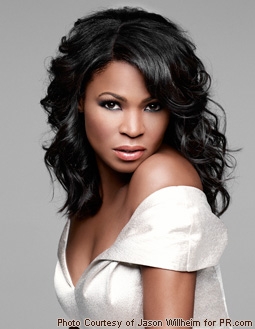
Upon hearing the buzz surrounding the new documentary feature film, Good Hair, I knew this topic would ignite a national discussion, not only within the African American community, but about how our American culture defines beauty. Apparently actress Nia Long felt the same way when she was approached by long time friend Chris Rock to participate in his film. Good Hair examines the lengths that African American women will go to and have gone to in the name of achieving, well… good hair.
As a Caucasian woman, speaking with Nia Long about this topic was a learning experience for me, which is why the prospect of doing this interview appealed to me. During our conversation, I asked her to explain how her hair and self image have evolved from childhood through her adult life as an actress existing within the strict beauty parameters of Hollywood. Nia Long is a woman who possesses a great deal of self worth and a strong foundation in the belief of inner beauty. Even she admits to the damaging effects of the media in its quest to guide all women towards a homogenized standard of beauty which includes the relentless pursuit of long, silky, flowing straight hair. Enter the African American woman’s obsession with relaxers, weaves and wigs and the time and money invested into the pursuit of good hair.
With a unique brand of humor that only Chris Rock can deliver, Good Hair, produced by HBO Films, explores how hairstyles effect self-esteem, relationships, careers and money within the black community with funny and enlightening commentary given by Ice-T, Nia Long, Raven-Symone, Maya Angelou, Al Sharpton and many other prominent African American figures. In watching clips from Good Hair it was Nia Long’s interview in particular that grabbed my attention. Her commentary in the film struck me as intelligent, enlightening and hilariously funny, and I knew I had to sit down with her to get her take on black hair and all that it encompasses. Nia and I wound up in a philosophical discussion about women’s beauty inside and out and societal pressures placed on women of different races and cultural backgrounds.
There is a bold assertiveness to Nia Long’s personality that is not always captured in her film roles, but is apparent in general everyday conversation with the actress. Her strength hits you like a ton of bricks and then smoothes out gracefully like a giant ocean wave that tempers shortly after crashing against the shoreline.
What I cherish most about the privilege of doing these interviews is the exchange of knowledge that grows from two different perspectives and life experiences. My interview with Nia Long didn’t disappoint.
PR.com (Allison Kugel): How were you first approached to take part in Chris Rock’s documentary, Good Hair?
Nia Long: I got a call from my publicist saying that Chris Rock was doing a documentary called Good Hair, and I thought, “Ok, that’s a good subject.” And it pretty much went from there. I went in and had an interview with him. We’ve been friends for a really long time. It was kind of a no-brainer for me to support a subject and a project that I think is super relevant.
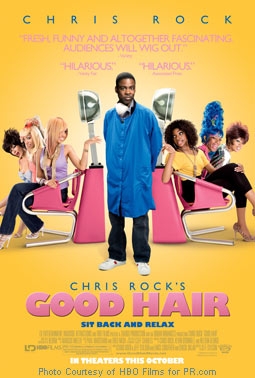
PR.com: Growing up, what were you taught about your ethnicity and your hair texture?
Nia Long: Growing up, my mom was a bit of a hippy. We’re originally from Brooklyn and we spent a lot of time in Iowa, and my mother was all about the Afro. I have pictures of me as a young girl with an Afro. I was taught to be proud of my blackness, proud of my hair, proud of who I am in my organic, raw state.
PR.com: So you didn’t have the same insecurities that I hear a lot of black women say they had when they were little? You had a different experience.
Nia Long: The insecurities definitely didn’t come from what was taught in the house. I think the insecurities stem from the images that we see in society. It’s a known fact that there are fewer women of color who are celebrated for their beauty. The insecurities come from the way we’re, I don’t want to say brainwashed, but media runs the world. Whatever media says is beautiful, after a while we tend to believe it and there are very few women that look like us that are called beautiful. Maybe not just women, but features, whether it’s your hair, your eyes, your nose, your ass, whatever it is.
PR.com: You said the standard of beauty is what society tells us it is. Then let’s say tomorrow a dark skinned black woman with natural kinky hair was made the next great sex symbol and she was on magazine covers. Would black women everywhere be taking down their weaves and throwing out their chemical relaxers?
Nia Long: No, I don’t think it’s that serious. I think weaves, ralaxers or [not using] relaxers are all choices we have, and it’s really about what makes you feel comfortable. The social issue as it relates to black beauty has more to do with the images that we’ve seen over a period of time. It’s not anything that’s necessarily spoken as much as it is something that’s visual. If you hear a song on the radio twenty-five times at first you may be like, “Ugh I can’t stand this song.” By the twenty-fifth time you might start liking it. By the hundredth time you’re dancing to it. So it’s really a very subtle thing, but I think it has a huge affect.
PR.com: Is natural black hair a no-no in Hollywood? Could you not walk into a meeting or an event with your natural hair?
Nia Long: I can do whatever I want to do because I don’t let those things dictate to me, or dictate my choice with my hair. But I will tell you that when you’re working on a set it’s much easier to have a weave because you don’t know who’s going to be in charge of the hair department. They may not be familiar with pressing hair or perming hair, or even putting in a weave for that matter. So for me it has a lot to do with convenience. Yes, it would be harder for me to get a job with my hair in an Afro because I will immediately be put into some sort of category. Hollywood follows the trend of what the media celebrates as beautiful. And you don’t see a lot of women walking around with Afros who are playing opposite Brad Pitt! You don’t see hardly any [black] women playing opposite Brad Pitt (laughs), but I doubt that she would have an Afro. When that happens, it will be a glorious day.
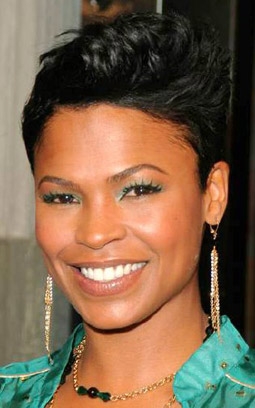
PR.com: Did you have the chance to speak to Maya Angelou about this topic, since she appears in Good Hair as well? Or do you know what her take on this topic is?
Nia Long: I didn’t speak with her personally, but she had a lot of great things to say; she’s awesome in [the movie]. I’d rather not quote her because you can’t quote Maya Angelou unless you’re reciting her poems (laughs).
PR.com: Every woman has slightly different hair. Since I’m talking to you specifically, if you don’t have any chemicals or weaves in your hair what does your natural hair look like?
Nia Long: My hair is probably a little past my shoulders and it’s dense and course and thick.
PR.com: Has anyone ever seen you on camera with your natural hair?
Nia Long: Yes. I did a film in the south of France where I played a Nigerian woman, and I had a very short Afro.
PR.com: Is there any guilt associated with relaxing your hair or with wearing Indian hair (the most common ethnicity for human hair weaves), like you’re betraying your culture or that you’re not proud of who you are? Or is it not that deep?
Nia Long: It’s not that deep for me, but I think this movie gives everybody something to think about as it relates to why they make certain hair choices. Like, this is just what I’m into right now. I’m into having a relaxer and I’m into having a weave. It’s not like I’m denying my blackness or saying that I want to look like a white woman. This is just a choice that I’m making right now. And I think most women of color feel that way. I don’t think it’s like, “Oh, I need to deny my blackness or try to look more like a white woman.” But this movie, in a very funny way, makes us think about why we do the things that we do.
PR.com: I’m Jewish and I have thick wavy hair. I spend hours straightening my hair and it’s got nothing to do with my culture. I just think my features look better with straight hair.
Nia Long: And most black women would be feeling the same way as you do.
PR.com: In an interview Chris Rock gave to Allison Samuels at Newsweek about the film and about the women who participated in the film, he was quoted as saying, “I think these women just want to be a part of something that explains what blacks feel they have to do to feel accepted in society.” Do you feel like you have to do certain things to feel accepted in society?
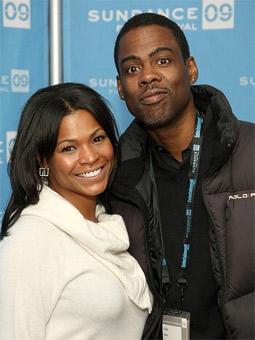
Nia Long: Not even a little bit. I’m not sure exactly what he was talking about. I think there is an underlying attitude in American culture that lighter skin and straighter hair is celebrated as being more beautiful. So that is something we have to deal with as Americans. Black people are the minority in terms of the images that we see. It depends on how you receive that message. I love my black skin, my black hair and everything about who I am. The movie is about the journey of the hair weave and the choices that we make, and the fact that the hair industry makes billions of dollars and there are very few black owned companies. So yes, there is going to be a social awaking as far as what we see and judge as being beautiful. But the movie is not at all trying to say, black people are trying to look white by putting hair weaves in.
PR.com: So it’s more so asking, “What’s the price of beauty?” And that’s an issue that’s universal.
Nia Long: Absolutely. And it’s the same thing for white women. White women get weaves too. They were doing hair weaves before black women were doing hair weaves, because we couldn’t afford it.
PR.com: I always assumed that [white] celebrities who had long hair, that it was their own hair. All of a sudden you find out this one has a weave and that one has a weave…
Nia Long: Most women you see in Hollywood have something going on in that head, white or black.
PR.com: Why?
Nia Long: It’s like a pair of shoes. Are you going to wear Gucci shoes or are you going to go to Payless? How much are you going to spend for your weave? It’s really a fashion choice.
PR.com: And it seems like it’s no longer as taboo. I was surprised that so many women in the film, Good Hair, were saying, “Yes, I wear a weave. No, this is not my real hair.”
Nia Long: I think it’s not taboo if you embrace why you’re doing it. If you’re not ashamed of your choice, why would it be taboo? Now if you asked me this questions a couple of years ago, there wouldn’t be as many women open to saying, “Oh yes, I have a weave. Look at me,” because it was taboo. It was a secret society. There is no more secret society, and after this movie there certainly won’t be (laughs)!
PR.com: What’s the average cost for a weave?
(After calling out to her girlfriend for a second opinion, Nia comes back to me with a starting figure that both women can agree upon.)
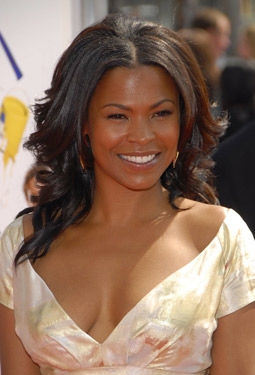
Nia Long: Fifteen hundred dollars for fifteen inches, but you know there are people who will charge you five thousand dollars for a weave. It depends on the hair, the stylist, where you’re getting your hair done. If you’re going into Beverly Hills, that’s an automatic fifteen hundred extra right there. If you do it at my house you could get the whole thing for five hundred (laughs)!
PR.com: What do you think about young black girls who are looking at black celebrities with this long gorgeous flowing hair, who don’t necessarily know that it’s fake hair, and that the celebrity spent thousands of dollars for it?
Nia Long: I think they know.
PR.com: You think little girls are aware of that?
Nia Long: Absolutely. How old do you mean?
PR.com: I don’t know what people know in the black community. I can only speak for myself, so maybe they do know. But if an eleven or twelve year old girl is looking at some of these celebrities and thinking, “How come my hair isn’t long and straight and gorgeous like that?” And they don’t know that this celebrity is wearing a five thousand dollar wig…
Nia Long: If you’re talking about Chicago, L.A., Atlanta where entertainment is more of a way of life then they absolutely understand what a hair weave is. I’ve seen girls thirteen, fourteen, fifteen getting extensions for a special event. And they’re not ashamed of it, because it’s an accessory. I think if you’re talking about the Midwest I don’t really think they care so much about what their hair is doing, or trying to look like a celebrity. India Arie did a song called “I Am Not My Hair,” and I think that’s the thing that we all need to understand, that we aren’t our hair. If you are doing the work that you need to do on the inside then you could be bald-headed and be gorgeous.
PR.com: There have been times when you’ve had very short hair and times when you’ve had long hair. Which way do you feel best and most confident in with your appearance?
Nia Long: I feel great both ways. For me right now wearing a weave is kind of a convenience because I have a young son, and I’m constantly running. I have a meeting this day and then I’ve got to go to the gym, and then I have to go to a baseball game with my son. But I feel great all different ways.
PR.com: How has becoming a mother added to how you feel about yourself as a woman, and in general?
Nia Long: I’m much more grounded and patient, and he is my main priority. And I think organization is the key, because right now I’m getting my hair and makeup done (Nia was preparing for an appearance on “Chelsea Lately” as we were speaking), but I have twenty-five other things that I know I need to accomplish today. And the people in my life who I work with, they have to be held accountable for their job. I don’t have the time in my day to worry about their job even if it relates to me. You can’t worry about everything when you’re a mom. You kind of have to focus on what is important for your child.
PR.com: Do you feel like you went from being a girl to being a woman?
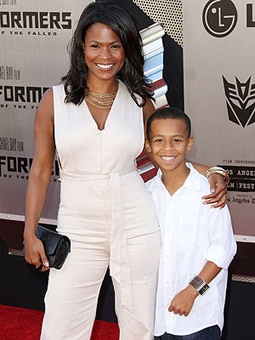
Nia Long: Oh my God! As soon as those labor pains kicked in! I thought, “So this is the rite of passage.”
PR.com: Exactly! All of a sudden you’re like, “Oh my God, I’m a woman! I’m like my mother now.”
Nia Long: It’s so true, and with each new stage of their development you start to feel more and more like a woman.
PR.com: This is a weird segue (laughs) but in Good Hair you said “Weave sex is a little awkward.” Explain that.
Nia Long: Oh, just stay on top. It’s so much easier. You don’t have to deal with, A) Anyone messing up your hair and B) Them running their fingers through your hair. If I’ve spent three hours getting my hair done, I’m sorry, sex is not worth messing up my hairdo… unless he’s really special… or has the money for me to get my hair done the next day (laughs).
PR.com: So if he’s weave-worthy, then he can run his fingers through your hair.
Nia Long: Absolutely!
PR.com: Why do you think HBO wanted to take part in this documentary?
Nia Long: Because Chris Rock is a genius. He’s not afraid to say the things we’re afraid to discuss. He’s respected in the community. He’s someone who has a voice that you listen to, and he’s funny. It’s much easier to receive a message through humor then it is through someone forcing the message down your throat. And in these times we’re much more open to comedy because there’s so much tragedy going on as it is.
PR.com: I want to ask you about black Hollywood. A lot of times things are different in this world from a white person’s perspective than they are from a black person’s perspective. Many black actors will say that they don’t have enough power, influence or enough good roles. But from my perspective, for instance, I see that Tyler Perry has his own studio, Will Smith is one of the biggest movie stars on the planet and Chris Rock just got this documentary made. As somebody who is on the outside looking in, what is it that I’m missing that the black community in Hollywood is trying to express as far as that goes?
Nia Long: If you look at Hollywood as a whole pie, what percentage of that pie is ethnic? There’s your answer.
PR.com: I never thought of it that way, and that’s what I mean.
Nia Long: Yeah, and I’m not just talking black. I’m saying ethnic.
PR.com: When you say ethnic, do you mean anybody who’s not white, anybody of color?
Nia Long: Isn’t that what it means when you check the thing on your passport?
PR.com: Well anybody can claim the term “ethnic” as their own.
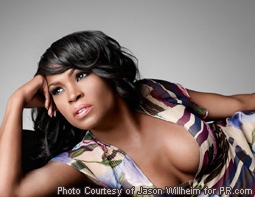
Nia Long: If your great grandfather was black and he married a Jewish woman and you’re in the airport, do you check black or do you check Jewish or American?
PR.com: It’s interesting that you ask that because my son is half Jewish and half Jamaican.
Nia Long: What does he check off?
PR.com: He’s five months old so he doesn’t check anything (laughs).
Nia Long: (Laughs). If his skin is black or brown teach him that he’s a person of color because that is how he will be treated in this country. My best girlfriend is Jewish and we have these conversations all the time. It is what it is. It doesn’t mean he has to deny his Jewish heritage, but if his skin is black he is going to be treated as a black person. And I know your Jamaican husband understands that, because my family is from the islands.
PR.com: Well he’s being raised in the Jewish faith. So I guess I would have to say that his race is African American and his religion is Jewish.
Nia Long: That’s a beautiful thing.
“Good Hair” opens in select cities October 9, 2009 and nationwide October 23, 2009. Visit GoodHairMovie.net for theaters and showtimes.
